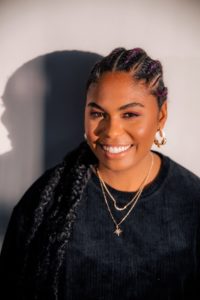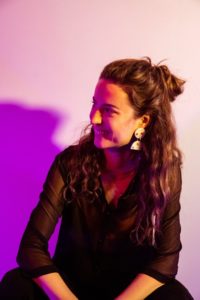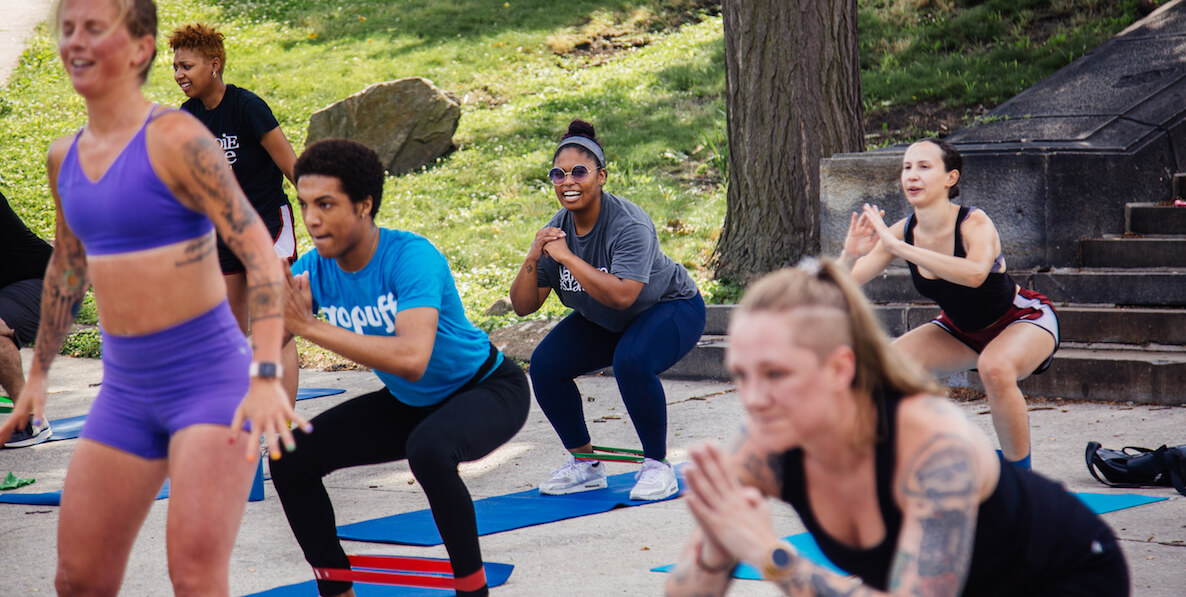You are greeted by the sound of soft music, and a woman’s steady voice guiding your breath: In, out. In, out.
You see her watering plants in a sun-dappled garden, and making tea as golden light pours through a kitchen window.
The woman continues to coach you, as you become enveloped by the comforting chimes of crystal singing bowls, and her clear direction to settle into your breathing, your life force. You feel a sense of relief, of peace, as the music and beautiful images continue to flow over you.
Welcome: You have entered the Nalaverse, an online platform of live and on-demand wellness classes, designed by and for Black women and other marginalized communities.
MORE ON MINDFULNESS
Launched last August by Philly natives Theresa Shropshire and Jane Maguire, Nalavese has grown to serve thousands of users from 78 different countries, including the U.S., U.K, Australia, India, Barbados, and Brazil. The company is also a part of the Sixers’ Innovation Lab, which offers free strategic, operational, and legal advice, as well as a pre-seed round of financing.
The road to Nalaverse
Globally, wellness is a $4 trillion industry, and growing every year. In the U.S., it’s still overwhelmingly white, but according to a National Health Interview Survey, the percentage of African Americans practicing yoga is on the rise. Indeed, several Black-owned or -focused businesses and organizations have launched in the last few years, including Liberate, a three-year-old meditation app “designed for the Black experience;” the national Black Yoga Teachers Alliance; and, closer to home, Sudan Green’s Spirits Up! yoga and meditation.
“I realized that it became more approachable to me because I was learning from a woman I could relate to,” Shropshire says. “And I wanted to make sure other Black women had that experience, to really connect to other Black women who had been through it, and were really passionate about mindfulness.”
Still, “I always kind of felt that wellness spaces weren’t totally created for me, as a Black woman,” Shropshire says. But in her second year of business school, as she was trying to figure out what to do with her career, friends advised her to meditate, try yoga or any number of ways to “get in touch with yourself.”
Shropshire tried out various meditation and yoga studios in the area, but nothing really clicked. She was often the only Black woman in the space, and she felt disconnected from her fellow practitioners.
Then one day, scrolling through Instagram, she came across the feed of Aubrey Howard, a Black woman who is a breath work teacher and “looked really free and happy,” Shropshire says. “I realized that it became more approachable to me because I was learning from a woman I could relate to. And I wanted to make sure other Black women had that experience, to really connect to other Black women who had been through it, and were really passionate about mindfulness.”

Maguire and Shropshire first met each other in high school at Germantown Friends School. They both took off to the West Coast for college, studying at UC Berkeley (Maguire) and Stanford (Shropshire), and eventually found their way back to their hometown. They didn’t reconnect again until Maguire reached out to Shropshire to ask her about her experience in the MBA program at Wharton. Out of their conversations back and forth grew a partnership that formed the foundation of what would become Nalaverse. (Maguire would eventually decide to leave the MBA program to focus on the business.)
The timing of their launch, last August 17, helped shape the model and focus of their platform. Even before the pandemic made online classes mandatory, the duo planned to host virtual sessions, something they plan to maintain for its accessibility. Their mission-driven operation, based on greater representation for Black individuals, also came at an important moment of nationwide racial reckoning.
Since last summer, Nalaverse has hosted over 600 live classes, and now offers an on-demand library of recorded classes, a continuing schedule of live classes, and a select number of in-person events scheduled for around Philly this summer. Classes range from 2-minute quick breathwork sessions you can do on your lunch break, to 30-minute yoga classes for a variety of experience levels. The company also hosts private classes for a number of corporations, including Google, Red Bull, Lyft, and the 76ers (the corporate team, not the basketball team).

Music is a big part of the Nalaverse brand, with the team creating custom Nalaverse beats and live sound healing for some classes. “We’re reenvisioning how on-demand content can really look and feel and so we’re sort of infusing music video qualities into it,” Maguire says. “You’re watching the video and you’re like oh this is so beautiful and then all of the sudden you’re so relaxed …because you’re meditating!”
Shropshire says that many people found Nalaverse on Instagram, or through events like a live Instagram session that Howard and Shropshire did in remembrance of George Floyd in 2020. Other community members have found Nalaverse because they followed the instructors who joined the platform.
Memberships are structured in a tiered pricing system, from $19.99 a month for access to the complete on-demand library and one live class per month, to $39.99 a month for access to all on-demand and live classes. For $69.99 a month, participants can also provide free classes for those who are not in an economic position to contribute. (All live classes are also a sliding scale, with $5 being the floor.)
“If you can’t see yourself in a space it’s hard to actually think that it’s something that you’re supposed to be doing,” Shropshire says.
So far, Shropshire and Maguire say the model has worked well; those who can pay do, and in the early days when the payment system wasn’t intuitive and classes were actually free, some class participants were so moved and wanting to contribute that they would email the company to ask how they could pay for the class.
Nalaverse started with just seven instructors, doing one class each day of the week, and now has 24 instructors across three continents. Most instructors are people of color, LGBTQ or part of other marginalized groups; they are paid a base rate, and split the revenue for the classes they teach.
The company is not yet profitable, but is “venture-backed,” Shropshire says. They are currently planning their next phases of growth for the year ahead.
Representation at the core
Aubrey Howard, whose breathwork teaching first inspired Shropshire, was one of the first seven instructors to teach on the platform, and continues to offer breathwork sessions on Nalaverse every week. She says that in her own practice, she has been dedicated to the effort to “shift that narrative around who is represented in wellness,” and feels “so, so happy” to have found Nalaverse and be a part of its goal as a company.
“Nalaverse is leading this movement, it being a Black-owned, women-led startup that offers healing practice,” Howard says. “Working with Nalaverse has been so powerful for me in my business to really strengthen and build these partnerships, and expand my reach.”
For Maguire and Shropshire, representation of Black women and those from marginalized communities is at the core of Nalaverse’s business, from the instructors who teach on the platform, to their promotional materials, to their tiered pricing system, to remaining committed to offering online classes as a way to remove many of the barriers that some face in access to wellness classes and resources.
“One of the biggest reasons that we really focus on this is just because if you can’t see yourself in a space it’s hard to actually think that it’s something that you’re supposed to be doing,” Shropshire says.
The company donates 10 percent of all of their revenue to organizations supporting mental health in the Black community, including Therapy for Black Girls, a platform which Shropshire used to find a therapist to whom she could relate. This month, for Pride, Maguire says donations are going to the National Queer and Trans Therapists of Color Network.
“Nalaverse is leading this movement, it being a Black-owned, women-led startup that offers healing practice,” Aubrey Howard says.
Nalaverse has also partnered with the Rail Park to offer a rotation of pop-up meditations, breathwork sessions, sound healing, and other modalities throughout the summer and are working with The Block Gives Back, a local organization which seeks to foster community engagement and action in Philadelphia, to do community classes on Fridays.
An invitation to Nalaverse
Shropshire and Maguire say the name Nalaverse comes from the founders’ focus on the limitless possibilities of what they seek to accomplish, imagining a completely different universe, while Shrophsire adds that the “verse” part also makes her think about song lyrics and poetry—forms of self-expression that are interwoven in Nalaverse’s offerings.
Nala, Shropshire says said, comes from thinking about “the energy of a really strong Black woman, a Black female goddess,” and adds that the word can also mean “successful woman” in Swahili, and “first drink of water in the desert,” the latter of which is an apt description, she says, of the vital relief and rejuvenation that she hopes Nalaverse classes provide.
“Anyone can go to the Nalaverse, and it’s just this universe within you that you already have access to,” she says.
In June, Nalaverse and Gorilla Power collaborated on a pop-up event, Powerverse. Photo by Rian Watkins


